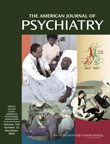Vitamin B12, Folate, and Homocysteine in Depression: The Rotterdam Study
Abstract
OBJECTIVE: The associations of vitamin B12, folate, and homocysteine with depression were examined in a population-based study. METHOD: The authors screened 3,884 elderly people for depressive symptoms. Subjects with positive screening results had psychiatric workups. Folate, vitamin B12, and homocysteine blood levels were compared in 278 persons with depressive symptoms, including 112 with depressive disorders, and 416 randomly selected reference subjects. Adjustments were made for age, gender, cardiovascular disease, and functional disability. RESULTS: Hyperhomocysteinemia, vitamin B12 deficiency, and to a lesser extent, folate deficiency were all related to depressive disorders. For folate deficiency and hyperhomocysteinemia, the association with depressive disorders was substantially reduced after adjustment for functional disability and cardiovascular disease, but for vitamin B12 this appeared independent. CONCLUSIONS: The association of vitamin B12 and folate with depressive disorders may have different underlying mechanisms. Vitamin B12 may be causally related to depression, whereas the relation with folate is due to physical comorbidity.



